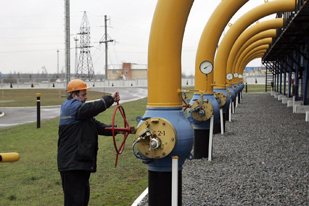
RUSSIA-BELARUS STANDOFF MAY BEGIN AFFECTING OIL TRANSIT TO EUROPE
RUSSIA-BELARUS STANDOFF MAY BEGIN AFFECTING OIL TRANSIT TO EUROPE
Deliveries of Russian oil via Belarus to points West suffered several brief interruptions during January 5 through 8, causing a slight decrease in the volumes scheduled for delivery to Poland and Germany. The problem has arisen following Minsk’s introduction of a transit charge for Russian oil through Belarusian pipelines, as a compensatory response to Moscow’s introduction of customs duties on oil supplies to Belarus (see EDM, January 8).
Confusion prevails regarding the responsibility for these delivery shortfalls. On January 8, European Energy Commissioner Andris Piebalgs and the relevant ministries in the Polish and German governments issued statements noting a deficit of information from the Russian and the Belarus sides. The statements call on both sides to provide detailed and prompt information and abide by their commercial commitments regarding oil supply and transit, respectively.
The position of Belarus is set down in a January 5 explanatory note by the government to foreign governments, a January 8 Ministry of Foreign Affairs statement, and follow-up media interviews by Belarus oil transit officials. According to them, Belarus has not interrupted the oil flow to third countries and will not do so. As owner of the pipelines, Belarus has introduced a transit charge — not customs duty — on Russian oil en route via Belarus territory to third countries. The transit tax reciprocates for Russia’s hike of the cost of oil supplies to Belarus through the introduction of customs duties on those supplies.
Moreover, effective January 1, the state oil-refining enterprise BelNaftakhim has suspended for January supply contracts that had previously been signed with Russian oil-producing companies. In a December 30 letter notifying Russia’s Transneft company of Minsk’s decision, BelNaftakhim complained that Russia’s customs duty on crude oil deliveries to Belarus has heavily hit the latter’s oil refining industry. According to BelNaftakhim and the Minsk government, purchases of Russian crude at this price would force the Belarus refineries to become loss-making. Existing crude oil stocks would enable Belarus refineries to operate at 60% to 65% of their normal operating capacities for several weeks while fuel oil consumption remains relatively low thanks to the mild winter.
The Minsk government hopes to resolve the differences with Russia through negotiations within the next few weeks while its stocks last. It proposes a mutual cancellation of Russia’s customs duty on oil supplies to Belarus and of the Belarus transit tax on Russian oil en route to third countries.
According to Belarus pipeline-operator Homel-Transnafta chief Alyaksey Kastsyuchenka and the Belarus ambassador in Warsaw, Pavel Latushka, the oil flow through the Russian pipeline was briefly halted three times on January 8 before reaching the point of entry into Belarus.
Moscow’s position is set out in media statements mostly by second-tier officials, while the top-level ones are unavailable during Orthodox Christmas. State Secretary and Deputy Minister of Economic Development and Trade Andrei Sharonov seems to coordinate positions for the officials on hand. Moscow is serving notice that it will plead force-majeure, citing circumstances beyond Russia’s control, in the event of any shortfalls in oil deliveries to European countries.
While accusing Belarus of having stopped the transit of Russian oil, Sharonov admits that “Russia itself stopped deliveries from Russian territory to Belarus because the transit had become impossible.” According to him, Belarus Customs has warned Russia’s Transneft pipeline monopoly in a letter that Belarus would impound certain volumes of Russian oil in the event that Russia does not pay the transit charge (Interfax, January 8).
Unnecessary confusion stems from accusations that BelNaftakhim “ordered a halt to the transit” of Russian oil to points West. In fact, BelNaftakhim only suspended deliveries of oil for refining in Belarus.
Russian officials systematically mis-describe the transport charge introduced by Belarus as a customs duty and term it illegitimate, inasmuch as customs duties cannot apply to transit. However, the charge in question is a transit tariff such as Russia pays to other transit countries and charges itself on its territory. Transneft president Semyon Vainshtok and vice-president Sergei Grigoriev are publicly holding out the possibility of negotiating with Belarus for mutually acceptable transit charges on that country’s territory. But they underscore that the negotiations would be a lengthy process, pending which Belarus should continue providing the transit service on the previous terms — that is, gratis.
The officials in Moscow are accusing Belarus of “siphoning off” Russian oil destined for EU countries from the transit pipeline. This accusation may be a preemptive one to discourage Belarus from resorting to this practice if the standoff continues.
Moscow calls for negotiations, on the condition that Belarus first cancels its transit tax. Moreover, Sharonov and other officials are highlighting Minsk’s heavy dependence on the Russian market for Belarus exports. Russia may close its market to certain Belarus products, the officials warn. Sharonov and the Duma’s International Relations committee chairman Konstantin Kosachev are even warning of a “trade war,” implying that Russia could only win such a war.
(Interfax, NTV Mir, Belapan, Belarus radio and television, January 6-8)


